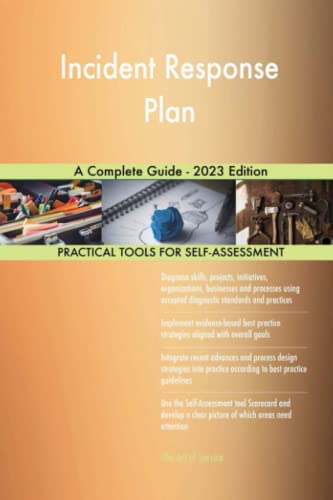Understanding the Importance of Incident Response Planning
In today’s digital landscape, the significance of a robust incident response plan cannot be overstated. As organizations increasingly depend on technology, they are more vulnerable to various security threats, making effective incident response critical for mitigating risks and ensuring swift recovery from incidents. Investing in well-researched literature on incident response not only enhances your knowledge base but also equips you with practical strategies to handle unforeseen challenges with confidence.
The right resources can transform theoretical knowledge into actionable insights. This blog post highlights some of the most relevant books on incident response planning that every security professional should consider adding to their toolkit. Whether you are a seasoned expert or just starting your journey in cybersecurity, these essential reads will provide you with a comprehensive understanding of planning, execution, and continuous improvement in incident response.
Featured Books
Incident Response Plan A Complete Guide – 2023 Edition
This comprehensive guide is an invaluable asset for any organization aiming to mitigate risks associated with incident responses. The 2023 edition is meticulously structured to provide practical insights, frameworks, and strategies that are up-to-date with the latest industry standards. With its user-friendly format and in-depth coverage of incident response basics, it facilitates understanding for both novices and experts alike. Authored by The Art of Service, this book serves as a roadmap, helping you craft a timely and effective incident response plan tailored to your specific needs. A must-have for any IT security library!
The Computer Incident Response Planning Handbook: Executable Plans For Protecting Information At Risk
This handbook provides a practical approach to drafting operational plans aimed at safeguarding an organization’s information assets during incidents. The book is well-regarded for its clear, executable strategies and an array of templates useful in developing customized response plans. Authoring a plan is essential, but understanding its execution may pose a challenge. This guide bridges that gap, making it a valuable resource for professionals seeking to enrich their incident management capabilities. A foundational read for building a resilient cyber defense posture.
Principles of Incident Response & Disaster Recovery (MindTap Course List)
This book highlights foundational principles in incident response and disaster recovery, making it ideal for both academic study and real-world application. It presents a well-rounded picture of the challenges organizations face and offers comprehensive solutions. With a focus on strategic planning and recovery processes, this resource is particularly useful for IT managers and team leaders looking to ensure their teams are prepared for every eventuality.
Crafting the InfoSec Playbook: Security Monitoring and Incident Response Master Plan
If you are seeking to create a comprehensive security monitoring and incident response strategy, this book is a must-read. It focuses on developing a detailed playbook that outlines sequential steps for handling incidents with a goal of minimizing damage and ensuring systematic recovery. Authored by O’Reilly Media, it integrates industry best practices with real-world case studies, making it an engaging read that’s rich in practical knowledge.
Incident Response Planning: Focused Preparation
For those looking for straightforward insights into incident response preparation, this book serves as an excellent starting point. It discusses the importance of focus and preparation in developing an effective incident response strategy. This easy-to-read book provides concise guidance, and its affordable price makes it an accessible option for individuals and teams alike. It’s a great introductory read for anyone involved in cybersecurity planning.
Incident Response for Windows: Adapt effective strategies for managing sophisticated cyberattacks
This practical guide is essential for organizations using Windows systems, as it dives deep into strategies tailored specifically for the unique challenges they pose. The author provides insight into managing cyberattacks effectively, with a focus on leveraging existing structures while preparing teams for future incidents. It’s an excellent tool for IT security professionals looking to elevate their defenses in the age of sophisticated threats.
Cybersecurity Incident & Vulnerability Response Playbooks
This book covers the operational procedures necessary for effectively planning and conducting cybersecurity incident response activities. As cybersecurity threats evolve, this guide provides updated procedures to address vulnerabilities within information systems. The playbooks outlined within are invaluable for public sector organizations; however, the strategies can be adapted across different sectors. A must-have resource for any organization focusing on robust cybersecurity strategies.
CBRN and Hazmat Incidents at Major Public Events: Planning and Response
This book takes a unique approach by addressing the planning and response strategies required for handling hazardous materials and chemical, biological, radiological, or nuclear incidents at large gatherings. Ideal for professionals involved in event safety management, it emphasizes the importance of preparedness in high-stakes environments. A crucial resource for anyone working to ensure public safety during large-scale activities.
Cyber Incident Response Plan A Complete Guide – 2021 Edition
This book provides a comprehensive overview of developing an effective cyber incident response plan. Its layout is designed to facilitate easy navigation through complex material, enabling readers to develop and refine their own strategies systematically. Whether seasoned or new to incident management, this guide is instrumental in constructing a framework that prepares you for the inevitable cyber incidents.
Disasters and Public Health: Planning and Response
This book expounds on the intersection between public health crises and incident response planning. It discusses the necessary preparations and strategic frameworks that public health officials must lay down to ensure safety during disasters. While not solely focused on cybersecurity, its principles are adaptable and relevant to professionals in emergency management fields. A vital addition for those looking to build a holistic understanding of incident-related crises and responses.














































